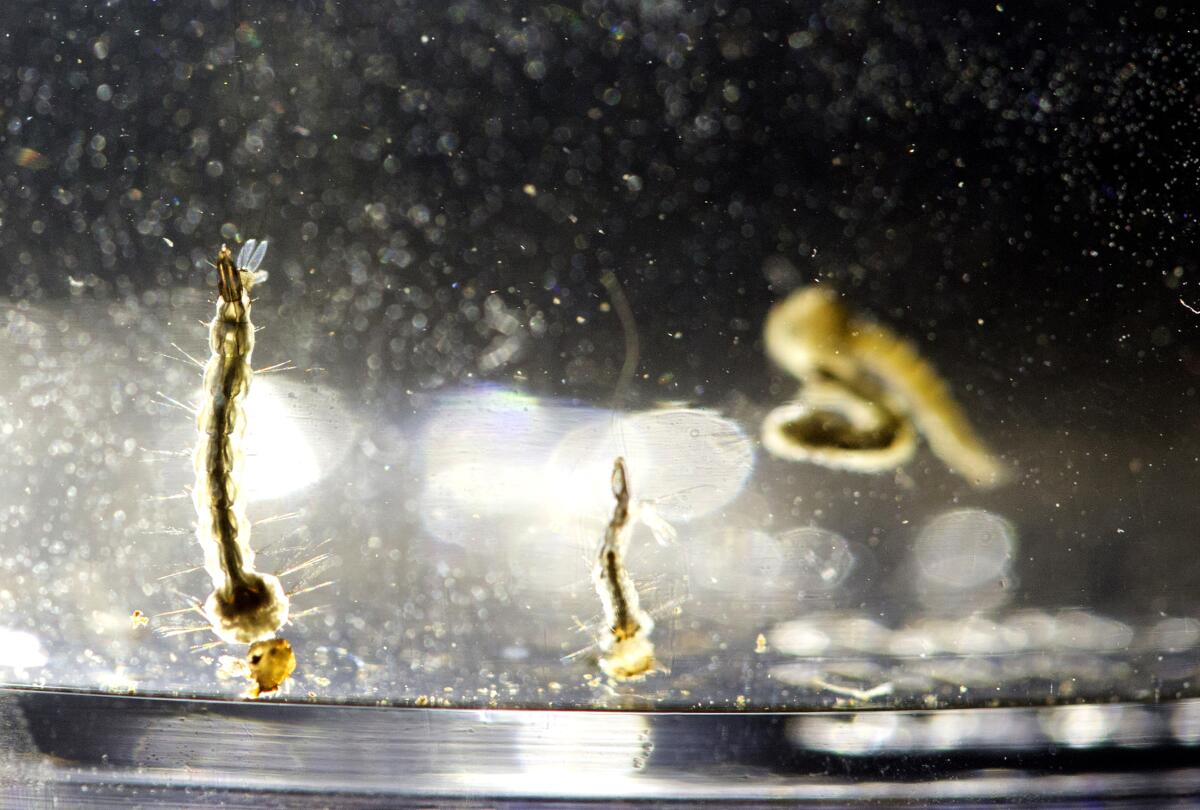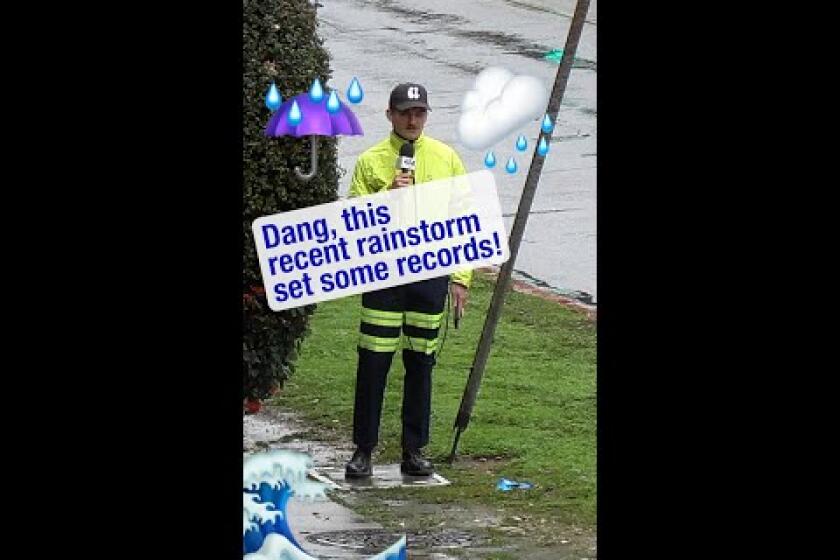All this rain could invite mosquitoes into your backyard. Here’s how to prevent that

- Share via
February started with heavy rainfall, five days that dumped up to 14 inches in some cities, creating the potential for standing water in lots of places — including your backyard.
Items such as wheelbarrows or watering cans can collect rainfall, creating potential breeding grounds for mosquitoes.
Susanne Kluh, general manager for the Greater Los Angeles County Vector Control District, said we should always be concerned about standing water.
However, current temperatures have been relatively colder, especially in the evenings, which makes it less habitable for mosquitoes.
Kluh and her team aren’t as worried about a mosquito invasion at the moment, but she said this is the time to take preventative measures ahead of warmer weather to stave off the bloodsucking insects.
Here’s what experts say you can do to keep mosquitoes away, what to do about bites and why some people attract mosquitoes more than others:
What attracts mosquitoes?
The growth of a neighborhood’s mosquito population will depend on the availability of potential breeding sources, said Steve Vetrone, the Greater Los Angeles County Vector Control District’s director of scientific-technical services.
According to the American Mosquito Control Assn., there are 30 different types of mosquitoes within the United States. While there are differences among them — for example, some feed during the day and others at night — they share a life cycle that is dependent on water to breed in.
People who have had COVID-19 have a significantly higher risk of suffering chronic fatigue than those who haven’t had the disease, a new CDC study shows.
Vector control agencies will try to eliminate mosquitoes in public sources such as gutters, underground storm drains, flood control channels and debris basins.
The district is calling on residents to eliminate potential sources around their homes to reduce the number of mosquito breeding sources collectively.
You can start by identifying items on your property that can hold standing water. Standing water left untouched for at least seven days is a magnet for mosquitoes. Typical sites include birdbaths, old tires and clogged gutters.
In addition, the Greater Los Angeles County Vector District lists a number of other backyard and household items that may be surreptitiously collecting standing water, such as portable basketball hoops, uncovered outdoor grills, potted plants with saucers and flower vases.
“Because mosquito larvae feed on decaying organic matter and other microorganisms, the water must be stagnant and contain some organic matter such as leaves, soil or grass clippings to support mosquito development,” said Daniel Markowski, American Mosquito Control Assn.’s technical advisor.
You can eliminate these breeding sites by draining or dumping the water, then blocking more from collecting there — for example, by turning over a bucket or covering the grill. Do this at least once a week.
This rainstorm set some records.
Preventative measures don’t have to stop on your side of the fence, said Kluh, who suggests talking to neighbors about routinely eliminating any source of standing water.
In her previous neighborhood during the spring, Kluh said she knocked on the doors of her neighbors and asked whether they were getting bitten by mosquitoes. When they answered positively, she shared her tips for disposing of standing water so that the guidance was shared with her whole block.
Why do mosquitoes bite me and not other people?
Two other prime mosquito attractants are bare skin and dark clothes. So when you’re enjoying yourself outdoors, wear long sleeves, long pants and light-colored, loose-fitting garments.
“Dark colors are not recommended in prime skeeter habitats because they stand out more, particularly in regards to background and contrasts,” Markowski said.
What humans exude can also attract mosquitoes, including breath odors, bacteria on our skin and other smells, he said.
“We are all different, and these different combinations are more or less attractive to different mosquito species,” Markowski said.
As Californians face non-stop rain from an atmospheric river this week see how rainfall totals in your area compares to other regions and previous years.
He said some studies have shown that certain blood types may be especially attractive to some species of mosquitoes. “I would surmise that the combination [of odors and bacteria], along with the blood type, is really what makes one person more attractive to a mosquito than others,” he said.
Your diet may also play a role in whether you get snacked on. Consuming foods such as bananas, avocados and grapes have shown to increase host-seeking by some mosquito species, but Markowski speculated that an individual’s metabolism is a bigger factor than the specific foods eaten.
How to get mosquitoes to buzz off
The Greater Los Angeles County Vector District says you can prevent mosquito bites by applying insect repellent that includes one of these active ingredients: DEET, picaridin, IR3535 (the trade name for ethyl butylacetylaminopropionate) or oil of lemon eucalyptus.
As with all products, Markowski said, it’s a good idea to treat a small area on the body first to ensure you don’t have an allergic reaction before applying the repellent broadly. Read the product label and follow all the usage guidelines.
The Centers for Disease Control and Prevention advises against spraying repellent under your clothing. It also suggests that if you’re using sunscreen, apply sunscreen first and insect repellent second.
The L.A. River should play a big role in supplying our local water needs. But residents can also make their properties more permeable for recharging aquifers.
The U.S. Environmental Protection Agency, meanwhile, has an online tool that helps you figure out what repellent would work best for you.
An alternative to chemical-based sprays or creams are ones with plant-based ingredients such as citronella, lavender and peppermint. Markowski said these ingredients are less effective than their synthetic counterparts, but they can work for you if mosquitoes don’t find you super attractive.
You can also try to make your home’s outdoor area inhospitable to mosquitoes by setting up several tiki torches or other devices that diffuse repellent. But the effectiveness of diffusers can vary according to the species of mosquito.
For example, the Vector Control District says citronella candles are effective at repelling mosquitoes only in the immediate radius around the candle, and only in the absence of a breeze.
In addition, a specific type of mosquito known as Aedes mosquitoes prefer ankles, so candles on tabletops won’t provide much coverage.
Try them one at a time until you find an approach that works best for you.
Certain plants can offer some level of protection on your patio too. These include citronella, a few other geranium varieties, plus marigolds, lemongrass, catnip, certain types of mint, lavender, and lantana. There are also common aromatic herbs that have limited ability to drive off mosquitoes, such as rosemary, garlic, basil, thyme and fennel.
If mosquitoes manage to bite you despite all these precautions, don’t scratch. Markowski said scratching can cause secondary infection and prolong the irritation. In extreme cases, scratched bites can leave scars.
An anti-itch cream is typically all you’ll need to alleviate the discomfort. If you’re highly allergic to mosquitoes, he said, you may need a cream with Benadryl or similar antihistamine.
More to Read
Sign up for Essential California
The most important California stories and recommendations in your inbox every morning.
You may occasionally receive promotional content from the Los Angeles Times.















